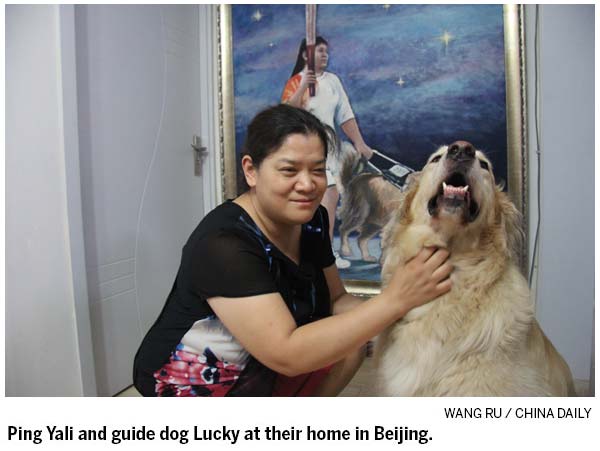Winner in competition, winner in life
Updated: 2012-08-13 10:09
By Wang Ru (China Daily)
|
|||||||||||

| |||
Lucky is Beijing's first trained guide dog, and the animal is often the reason Ping is invited to appear on television. But what few people realize is, Ping herself has a glorious, if unsung, past.
She is a gold medalist from the Paralympic Games in Long Island, New York.
The year was 1984 and Ping was only 22, but she won China's first gold medal in the long jump event. The sports meet was then known as the International Games for the Disabled, and was held before the Olympic Games.
Ping, born blind in one eye and with very little sight in the other, shed tears of joy when she heard the Chinese national anthem being played as she stood on the winners' rostrum.
In the past, Ping often had to explain that she was the first Chinese athlete who won gold, an achievement often credited to shooter Xu Haifeng, who also took a gold in the 1984 Olympic Game in Los Angeles later that year.
But after going through the ups and downs of her extraordinary life, Ping, now the owner of four massage parlors using blind masseuses in Beijing, prefers talking about business rather than gold medals.
Born in Beijing, Ping has been blind from a congenital cataract. As the youngest daughter and the only disabled child of the family, Ping was given a lot of love and care by her mother.
While attending a school for the visually handicapped, the athletic Ping was encouraged to train for running and the long jump.
A blind athlete has many barriers to overcome, both physical and mental. It is tough enough for a blind person to walk, let alone run or jump. Ping says most blind people have a constant fear of running into obstacles.
"One of our innermost fears is that of falling into holes. For us, this symbolizes death. The two go hand-in-hand," she says.
Ping overcame this mental barrier and gradually found a way to train effectively with her coach. Her coach would physically demonstrate the different steps in doing the long jump, and Ping kept her hands on her coach's body, making mental notes so she could remember the moves.
The tough training often exhausted Ping, but her victories at the various games kept her going. In 1982, Ping was selected to participate in the Far East and South Pacific Games for the Disabled in Hong Kong, the first time China sent athletes. Ping won a silver medal that year.
"I couldn't see my national flag being raised, and the national anthem is played only for the champion, so I promised myself I had to win gold," she says.
After she did win gold in 1984, the government gave her a small apartment and 300 yuan ($47) and Ping went back to work at the welfare factory for the disabled.
"After winning the championship, life presented me with many new problems," she says. "My troubles were far from over. It meant I had to start from scratch."
Ping gave birth to a son, who was also born blind, in cruel twist of fate. In 1997, the factory she was working at closed down, and she also got divorced. She was so dejected she thought about ending her life.
She says it was her son who gave her strength to carry on.
During the Spring Festival that year, she received another 300 yuan from the government, as a subsidy for needy families. "Ironically, it reminded of the reward they gave me for winning the gold medal. I told myself this was the last time I was going to get government support," Ping recalls.
"If my blind son had to depend solely on government aid, I would consider myself a failure as a mother. So to set the benchmark, I told myself I had to start my own business."
In 2001, Ping Yali became a licensed massage practitioner and opened a small business in her home with the help of friends.
It was tough going during the early stages. At first, Ping couldn't afford an accountant. And in order to attract more customers, she charged low prices. Sometimes, after a long, hard day, she would find her reward was a fake 100-yuan note. But there were also good encounters.
"The kind-hearted helped me through the turbulent times. They came to me for massages, and these kind souls gave me the strength and motivation to keep going."
Now Ping has a chain of four massage parlors in Beijing, employing more than 20 disabled workers.
And she sums it up with a simple statement: "When misfortunes come one after another, don't give up. Think of the strong points in your character. And, starting from the things that you can do, take it step by step until you reach your final goal. Please never give up, and a brighter tomorrow will eventually dawn."
wangru@chinadaily.com.cn
Related Stories
Children play chess, Chinese chess and other mind games 2012-08-09 14:12
Scientists identify gene causing congenital blindness 2012-08-02 11:13
Opinions fly now the Games have begun 2012-08-01 10:43
In the mood for sports 2012-08-06 11:18
Today's Top News
Rescuers race against time for quake victims
Telecom workers restore links
Coal mine blast kills 18 in Jilin
Intl scholarship puts China on the map
More bird flu patients discharged
Gold loses sheen, but still a safe bet
US 'turns blind eye to human rights'
Telecom workers restore links
Hot Topics
Lunar probe , China growth forecasts, Emission rules get tougher, China seen through 'colored lens', International board,
Editor's Picks

|

|

|

|

|

|








